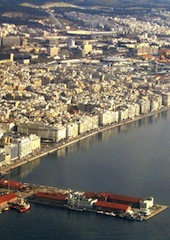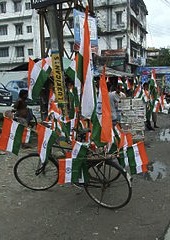Thessaloniki: Heart of Macedonia
Why a silly naming dispute in the Balkans should not be allowed to fester.
November 3, 2013

The Galerius Arch has been the eastern gateway into the pulsating port city of Thessaloniki since it was built in 299 A.D. to commemorate the Roman emperor’s victory over the Persians.
The thoroughfare passing beneath the arch – the Via Egnatia – is even older. It dates from 146 B.C. and extends 400 kilometers.
The road ran from the Adriatic town of Durres across the mountains of Macedonia and then south to this magnificent city at the top of the Aegean Sea. The Via Egnatia was the second-most important highway in the Roman Empire and the first to span the Balkan Peninsula. It remains Thessaloniki’s principal thoroughfare.

Historically, the port Thessaloniki on the Via Egnatia was the center of a Balkan trade network. (Credit: Eric Gaba)
It is tragic that a geopolitical argument prevents Thessaloniki from being fully integrated with its traditional hinterland. The problem is the rancorous, silly dispute between the Macedonian region of former Yugoslavia and Greece that has dragged on, impeding regional progress for two decades.
Stalemate
Athens argues that the Republic of Macedonia that emerged from Yugoslavia in 1990 is not entitled to be called “Macedonia” because the real Macedonia is in Greece.
So adamant is Greece that, in 2008, it vetoed its vulnerable northern neighbor’s bid to join NATO and continues to block Macedonia’s path to the European Union.
The Slavic Macedonians share some of the blame. They have only a connection of geography to the ancient Macedonians, whose most famous son, Alexander the Great, died hundreds of years before Slavs even arrived in the Balkans.
It’s taken as an insult that the Republic of Macedonia named the airport of its capital city, Skopje, the “Alexander the Great Airport,” even after Greece had already named a nearby airport in Greek Macedonia the same.
After initiating that controversy, Skopje renamed a soccer stadium the “Phillip II Arena” after Alexander’s father, who conquered much of Greece before Alexander’s famous empire-building. Pursuing a fraudulent identity, Skopje has built statues and tributes to a Hellenic-speaking tribe with which it has no lineage.
Despite a far more pressing economic crisis, Greece allows the dispute to fester. October brought more angry exchanges as the Greek prime minister accused Skopje of intransigence.
Unhelpfully, Greece insists that in international organizations its neighbor be identified as FYROM, the Former Yugoslav Republic of Macedonia. Thus, Macedonia’s prime minister countered, asking Greeks how they would feel if their country was called “the former Ottoman province of Greece,” a pointed reminder that Greece endured 400 years of Turkish rule.
Moving on
A sensible solution is for Skopje to have the name Northern Macedonia. This would acknowledge that the Macedonian heartland is to the south in Greece and that only an accident of history resulted in the southern part of the former Yugoslavia having the same name.
Of course, strife and bloodshed are all too common in the Balkans and Thessaloniki has been a particular victim.
Traditionally a melting pot of cultures and ethnicities, Thessaloniki endured the Romans and then the Turks who were only finally beaten and driven out in 1912. The victorious Greeks sought to obliterate all evidence of Ottoman rule, destroying all but one of the city’s minarets.
Further outrage came under the Germans when the Nazis deported and killed Thessaloniki’s 50,000 strong Jewish community, which had flourished since receiving sanctuary from the Turkish sultan after being expelled from Spain in 1492.
Thessaloniki somehow manages, despite the political standoff and rail and road delays at the Macedonian border. But it would be so much more vibrant if it could resume its rightful place as the commercial center of an integrated, peaceful Balkan region, the beating heart of the Via Egnatia.
Takeaways
A silly dispute between the Macedonian region of former Yugoslavia and Greece has dragged on rancorously.
The ongoing dispute prevents Thessaloniki from being fully integrated with its traditional hinterland.
Despite real crises, Greece allows the dispute to fester. In October, the Greek PM accused Skopje of intransigence.
One solution is for Skopje to take the name “Northern Macedonia,” implying the Macedonian heartland is in Greece.
Strife and bloodshed are all too common in the Balkans and Thessaloniki has been a particular victim.
Read previous

The Emergence of Two Indias
November 2, 2013
